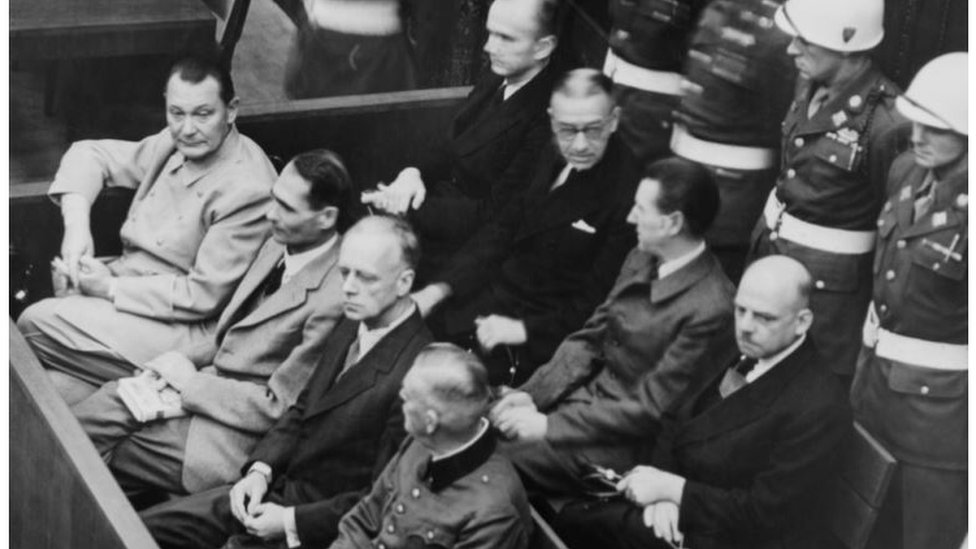The Holocaust – Prosecuting Those Who Were Involved Even After 80 Years

Eighty years now, since millions of people were brutally murdered, beside the millions of others who were targeted and killed by the Nazis in the Holocaust during the World War II.
Today, January 27, on the 77th anniversary of the liberation of Auschwitz concentration camp, the world memorializes International Holocaust Remembrance Day and the end of the Nuremberg trials held to bring Nazi war criminals to justice, a series of 13 trials carried out in Nuremberg, Germany, between 1945 and 1949.
On Thursday, January 20, the UN has decided to combat the Holocaust denial, urging member states and social media companies to help fight anti-Semitism, according to the BBC.
The Israeli occupation and Germany presented the resolution that was passed without a vote by the 193-member General Assembly.
The move sends “a strong message against the denial or the distortion of these historical facts,” the UN said.
The Holocaust Remembrance Day
Around Six million Jewish died in the Holocaust, the Nazi Germany's campaign to “eradicate” Jewish population in Europe.
On Thursday, the UN General Assembly said it “rejects and condemns without any reservation any denial of the Holocaust as a historical event, either in full or in part,” according to BBC.
“Ignoring historical facts increases the risk that they will be repeated,” Germany's UN Ambassador Antje Leendertse said.
Condemnations were directed to nations that still preserve the places that once served as Nazi death camps.
In addition to the distortion and denial of the Holocaust, American-born Israeli historian and Nazi hunter, Dr. Efraim Zuroff said, in his interview with BBC, that he is always persecuting the Holocaust criminals considering this as a duty.
However, the surviving criminals are of advanced age and have not much life left to live.
So what prompted Dr. Efraim Zuroff to keep following them? During the interview, he said that he had many reasons to do so, but the first reason is because these criminals did not even regret what they had done eighty years ago.
“I have never met any Nazi criminal in all these years who expressed remorse and asked for atonement,” he said.
Zuroff, president and director of the Simon Wiesenthal Center in Jerusalem, is stunned by how the advancing age of Nazi criminals can be seen as a considerable factor to escape jail.
Knocking the Door
On the Holocaust Memorial Day many around the world remember 6 million Jewish people who were killed by the Nazis and millions, including black people, who tortured and were murdered under Nazi persecution, not to mention those who murdered in genocides during the decades that followed the World War II.
Two suspected Nazis are currently facing trials in Germany, and Dr. Zuroff is following the proceedings.
The first case concerned Joseph Schutz, who is 100 years old, accused of working as “a guard at the Sachsenhausen concentration camp in Germany for more than three years.”
The alleged criminal was charged with “complicity in the murder of 3,512 victims.”
A 96-year-old woman, Irmgard Furchner, was the second case, when she was working as “a secretary to a commandant at Stutthof concentration camp from June 1943 until April 1945.” In this period 11,430 convicts were killed.
“As long as this effort goes on, these people in theory can't sleep peacefully and can never be sure that there won't be a knock on their door one day,” Zuroff says.
He declared that the passage of time does not remove their crimes and old age “should not justify the crimes they have committed.”
When the World War II ended, many countries arrested the Nazis and brought them to trials.
“The Nuremberg Trials were just the tip of the iceberg,” Zuroff says.
"In every European country, there were hundreds, sometimes thousands, in West Germany there were 200,000 investigative cases and 120,000 indictments between 1949 and 1985, but fewer than 7,000 convictions,” he added.
However, the authorities, today, have very clear reasons for not devoting time and resources to this effort, says Zuroff.
Success at Last
The last known living commander of a World War II concentration camp, Dinko Šakić, was convicted and this was the recent success Zuroff has achieved.
Dinko was responsible for killing nearly 100,000 people in the camp.
Zuroff's greatest success to date is the conviction of Dinko Šakić.
Thanks to Zuroff, Šakić was sentenced to 20 years of jail on October 4, 1998.
When leaving the courtroom after the trial, a man stopped the Nazi hunter to thank him.
“The man told me, without your work, this trial would never have happened, I had no idea who he was,” Zuroff said.
That man was the brother of Milo Bošković, a Physician who had been detained in the camp in 1944.
According to the BBC, Šakić had arrested him randomly during attempts to fight anti-Nazi resistance activism.
“Šakić said that Milo Bošković didn't want to be hanged; so, he pulled out his gun and shot him in the head,” Zuroff says.
“I think your brother did not even dream that Croatia would convict Dinko Šakić, the great national hero, and here he is, tried democratically, no matter how long it took, but here we are, watching it happen."
















